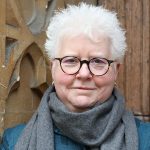Andrew McMillan is one of Val McDermid’s chosen writers for the International Literature Showcase this year. Val describes him as exploring “marginal lives and masculinity as well as his own lived experience as a gay man from the North of England.” You can find out more about Andrew and his work on his ILS profile page. We asked him five quick questions –
How do you see your queerness in terms of your life and your writing?
I remember when I first started out I never wanted to be thought of as a gay writer- I always thought that I was just a writer who was speaking from his own personal experience, speaking about love, about the body, and because I’d only ever been in love with men or touched the bodies of other men (in a sexual sense) that that’s just what the writing happened to be about.
More and more though I know that that is a position which comes out of privilege of not needing that label or community to feel safe when I was younger. Now I’m really proud to call myself a queer writer, to feel part of a community with so many different generations of writers, including all those in Val’s ILS selection.
Was it hard for you to make the decision to be completely open about who you are in your work?
Not at all, it always felt completely natural – I didn’t necessarily think the work would end up speaking to as broad and wide an audience as it has, but it always seemed to me that if this was the subject then the work had to look at it directly – I always hated in films when a shot would be of the curtains fluttering and then it would cut to someone smoking a cigarette afterwards. If this was to be the subject it just had to look at it clearly and directly and without averting its eyes.
When did you come out to yourself as a writer?
I always ran away from it – I think because it was what my dad did, and whatever your parents do at a certain age is embarrassing, even if they were James Bond. I wanted to be a politician, an actor… but it always came back to writing. And about 16 or 17 I just took that leap.
What was your route to publication? Did you feel that your identity was an obstacle or even a benefit?
A lot of the poems in the first book Physical were rejected by all the poetry magazines, everyone you could think of, and I wasn’t necessarily writing physical at a time, even though it was only 4/5 years ago , where there were a lot of young queer poets being published, I think that’s changed very rapidly now. I just knew there were my poems and this is what I needed to write.
Which writers were your touchstones? Who first showed you a possible world that you might inhabit?
Thom Gunn was massively important for me – I read him when I was 16 and, despite his relative conservatism, particularly in the early work, I suddenly saw a queer life might be worthy of literature.

 Find out more about Val McDermid’s list of LBGTQI+ writers.
Find out more about Val McDermid’s list of LBGTQI+ writers.